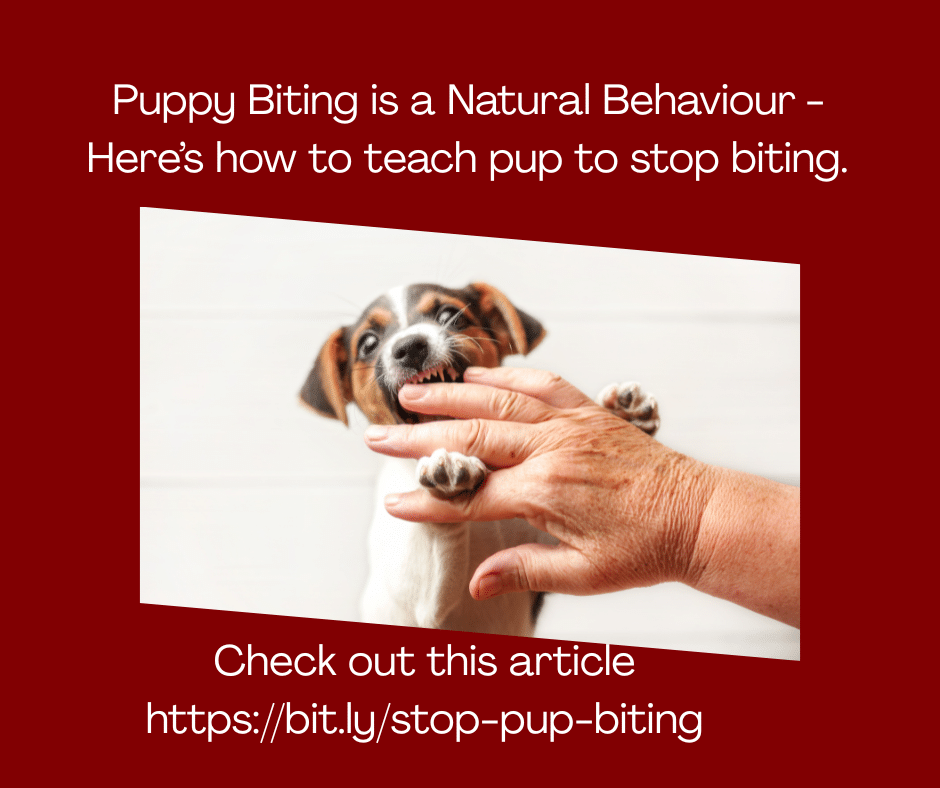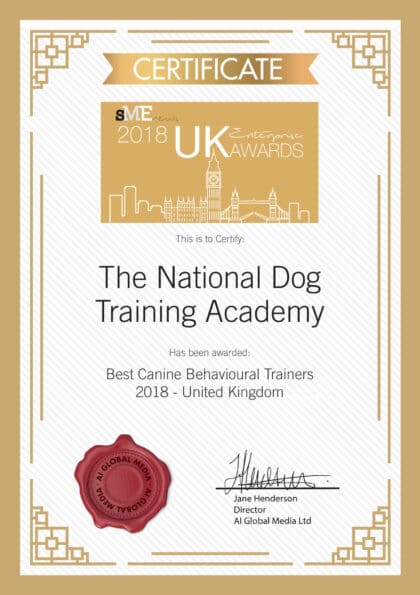
How to Stop Puppy Biting (Calm, Kind & Consistent Training)
Puppy teeth are like needles — every new puppy owner knows the feeling. Puppy biting/nipping can feel overwhelming, but here’s the good news: it’s completely normal. Puppies use their mouths to play, explore, and communicate.
The key is understanding why they bite, and teaching them from the very start that while play biting is fine with other dogs, it’s never okay with humans. With calm, consistent training, you can soon help your pup to stop puppy biting.
&
Why Do Puppies Bite?
Biting is the way pups play with their littermates. They also use their mouths to play, test boundaries, and explore their world.
When your puppy moves into your home, that behaviour doesn’t just disappear. It can even increase, because:
- They want attention or play. Biting is the way they’ve learned to say “come on, play with me!”
- Something you are wearing seems like a good toy. Maybe your sleeve, your hair or even your trouser leg or dressing gown belt.
- They’re teething. Just like babies, puppies chew and bite to relieve sore gums.
- They’re excited or over-tired. Mouthiness often peaks when puppies are overstimulated or need a rest.
Older dogs will often help teach a puppy what’s acceptable during play. They’ll correct a pup gently if the play gets too rough. But puppies also need to learn that humans are different. What’s fine with another dog isn’t acceptable with people — and that lesson has to come from you and all the humans in their world.
How to Stop Puppy Biting: Step by Step
-
If biting starts when you’re having a calm cuddle → Walk away
- As soon as biting starts, calmly stop interacting, a gentle ‘no’ is fine too.
- Don’t just turn your back, walk away, preferably leave the room.
- When you return to your pup have something for puppy to do, for example a kong or a licky mat – something that redirects pup away from your hands.
- Remember, when your puppy accepts cuddles and strokes without biting, praise and reward.
-
If biting is to get tempt you to play →Be firm, but fair
- Calmly but firmly, say “no” once, without shouting.
- Remove pup from your trouser leg or whatever they are biting.
- Once pup lets go, redirect to a toy, away from you.
- If pup comes back and starts biting again, repeat.
- If pup comes back a third time, then it’s time for some crate rest.
- When you let pup out of the crate, have something ready for pup to do, like a kong or a licky mat.
- Praise pup when they focus on this.
-
If biting is excitement or tired → Time for a rest
- If pup is overexcited or tired then pop pup in their crate for a sleep.
- Try to keep a check if there is a particular time of day when it’s worse – usually late afternoon, early evening.
- Once you know the time of day it is worse, pop pup in the crate, BEFORE, the biting and manic behaviour begins. Give pup a kong in the crate to calm down.
-
Be consistent every single time
- If one family member encourages the biting through play, your puppy won’t understand.
- Make sure everyone who handles your puppy follows the same rules.
- Consistency is what makes the lesson stick.
What To Do
- Pop puppy in the crate with a kong or safe chew toy when children want attention or want to run around.
- Always try to teach pup the right thing to do, rather than having to correct the wrong thing, for example, giving puppy rest time when they’re tired.
- Don’t let play get overexciting, keep it to a level that doesn’t encourage biting.
What Not To Do
- Don’t shout, smack, or scare your puppy. It doesn’t stop the behaviour — it just adds stress.
- Don’t laugh, roughhouse, or stroke when your puppy bites. That’s attention, which rewards the behaviour.
- Don’t assume they’ll “grow out of it.” Puppies who get attention for biting often carry it into adulthood.
When Puppy Biting Becomes a Problem
For most puppies, biting peaks around 3–6 months of age and then fades with training. But sometimes extra help is needed.
You should seek professional advice if:
- Biting breaks the skin regularly.
- Your puppy growls, snarls, or guards food or toys.
- The behaviour continues despite your consistent efforts.
It’s always easier to address biting early, before it becomes a lasting habit.
Quick Tips for Success
-
Support pup. Keep excitement levels low.
- Be consistent. Have a plan that all the family can keep to. Don’t expect young children to manage puppy biting without support.
- Reward the good. Every time your puppy plays calmly, reinforce it.
- Expect setbacks. Teething and tiredness can cause flare-ups — stick with the plan.
Final Thoughts
Biting is normal behaviour for a pup, but it’s not something to ignore. Puppies must learn that while dogs may continue to play bite with each other for fun, humans are off-limits. With calm, consistent handling, your puppy will quickly understand the difference.
And remember: this stage does pass. In just a few months, those needle teeth will be gone, and your puppy will have learned that gentle play gets the best rewards.
If you need extra support, our training classes, online training and one-to-one guidance are always here to help.
Check out all puppy training options here.
Yes, biting is a normal part of puppy development. Puppies use their mouths to explore and learn, especially during teething.
A gentle, but firm ‘no,’ get up and walk away. You can then direct pup to a toy or a chew toy.
No. It’s a natural puppy behaviour. However, that doesn’t mean you can’t put pup in their crate for ‘time-out,’ as long as the crate is trained and pup uses it for rest and sleep.
Most puppies reduce biting as their adult teeth come in, usually around 6 months of age, with consistent training and guidance. But if you don’t train puppy, the biting will continue into adulthood.









